The Quake World Championship was a battle of young vs old
Old school Quake veterans clash with the new kids on the block at QuakeCon 2017.
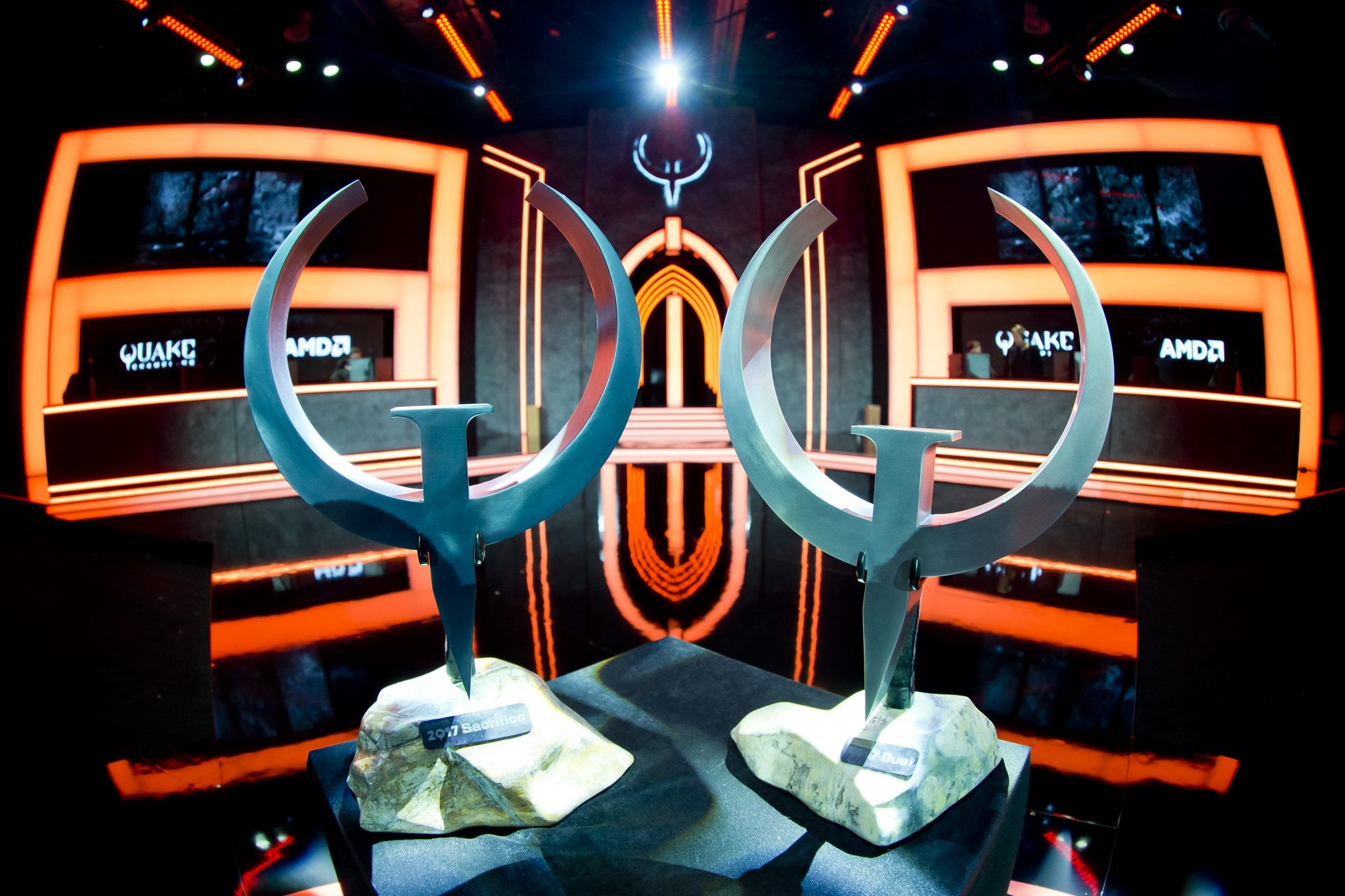
There is a high school reunion backstage at QuakeCon. The silver pots of catered food delivered by the towering Gaylord Texan above keeps everyone buoyant, and occasionally a good samaritan wanders in with a short pyramid of Domino’s pizzas. The casters are hard at work on the corner of the stage, and the on-deck circle is filled with whirring computers hardwired to LAN cable for any enterprising team looking to get a few more reps in before showtime. For the most part, the Quakers are relaxed. There is laughter and shit-talk, and enveloping bear-hugs offered between friends who haven’t seen each other in far too long.
In recent years, fans of the mercurial Quake franchise haven’t had much reason to play outside of id Software’s yearly love letter to the franchise, but the upper echelon of the scene remains sturdy. Tim “DaHanG” Fogarty and Andrew “id_” Trulli are both in their late-20s and play for Team Liquid’s Overwatch squad—but they’ve each taken a respite from that game to form a (slightly impromptu) team for this year’s Quake Champions tournament. The lithe Shane “Rapha” Hendrixson is here—since 2008 he’s traded titles in the 1v1 dueling bracket against Alexey “Cypher” Yanushevsky. He’s entering this year’s show defending championships from both 2015 and 2016.
I spot Sander “Vo0” Kaasjager sequestered away from the rest of the crowd, playing endless deathmatches to keep himself frosty. In his jersey and trademark gamer grimace, he doesn’t look much different from the man who famously lost to Johnathan “Fatal1ty” Wendel in the grand finals of the 2005 Cyberathlete World Tour in what was then the biggest prize pool in the history of competitive gaming. Together, they represent the first generation of esports—the first men who dared to make a living playing video games. The world has passed them by, but they’re not leaving without a fight.
“I started playing Quake in 2001, I’ve known some of these guys for 10 years,” says id_ backstage with a tub of lunch in his hands. “Quake has a longstanding community for over a decade, and those players will always come out of the woodwork to compete. Not just for money, but for the pride and the title, that’s something that Quakers live for.”
Quake reborn
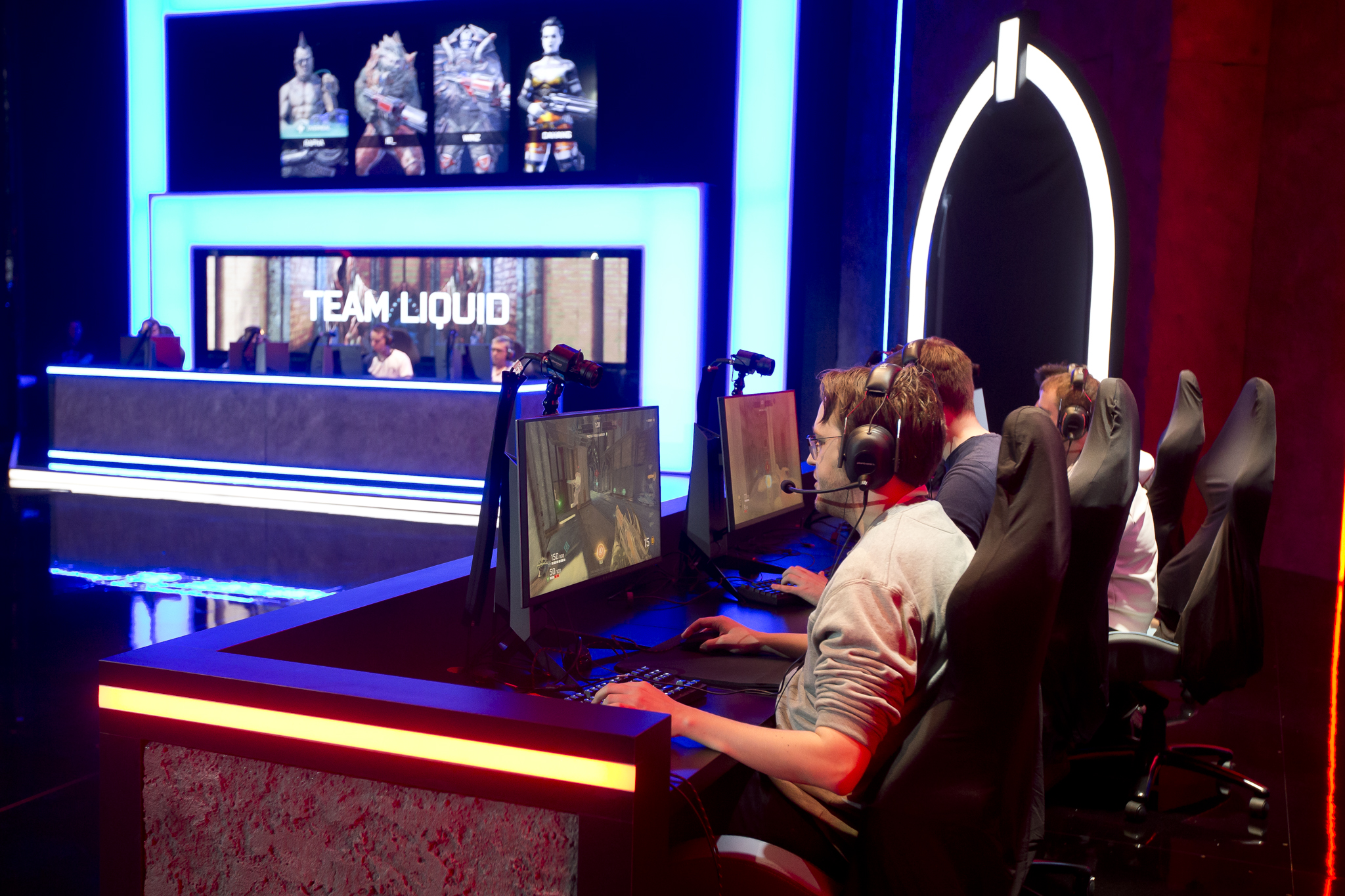
The QuakeCon tournament, which previously focused on minor bounties in stale Quake Live brackets, now features a million-dollar Champions prizepool.
For the past seven years, the Quake game de jure was Quake Live, the still-active browser emulation of the legendary Quake III: Arena. It served as the franchise’s testament and tomb. There hadn’t been a new Quake game since 2005’s middling Quake 4, and as the esports industry hit its tipping point, id software instead chose to focus on their single-player ambitions with the ambitious Rage and the long-gestating Doom reboot. The cadre of Quake pros still showed up to QuakeCon every year to reignite old rivalries, but there wasn’t much to play for beyond that.
However, the mood is different this year. For the first time in forever, QuakeCon is headlined by its namesake game. The free-to-play Quake Champions is on the horizon, and the QuakeCon tournament, which previously focused on minor bounties in stale Quake Live brackets, now features a million-dollar Champions prizepool. You could consider it a commencement ceremony for an esports initiative that aims to make Quake a crucial fixture in the scene again. Already, Bethesda has announced two Dreamhack Quake Champions tournaments before the end of the year, and both are paying out decent prize money. The marketing here is transparent—at this point it’s harder to find a game company that’s not doubling-down into esports—but the circumstances are unique given the heritage that was already present. These Quake players would’ve gathered here anyway, but now, they get to be professionals again.
Rapha fits the bill of the long-suffering FPS pro perfectly. He’s an incredible duelist who can track down railgun headshots with his eyes closed, but he hasn’t been able to find a game that fits his skillset since the Quake scene dried up during his prime. He had a brief affair with Ubisoft’s dead-on-arrival ShootMania, and he tried and failed to find his groove on the Team Liquid Overwatch team. But that was it. He was doomed to a purgatory of yearly Quake Live matches against the same tired competition he faced as a college kid. The Quake Champions announcement changed everything. He can finally go back home.
Keep up to date with the most important stories and the best deals, as picked by the PC Gamer team.
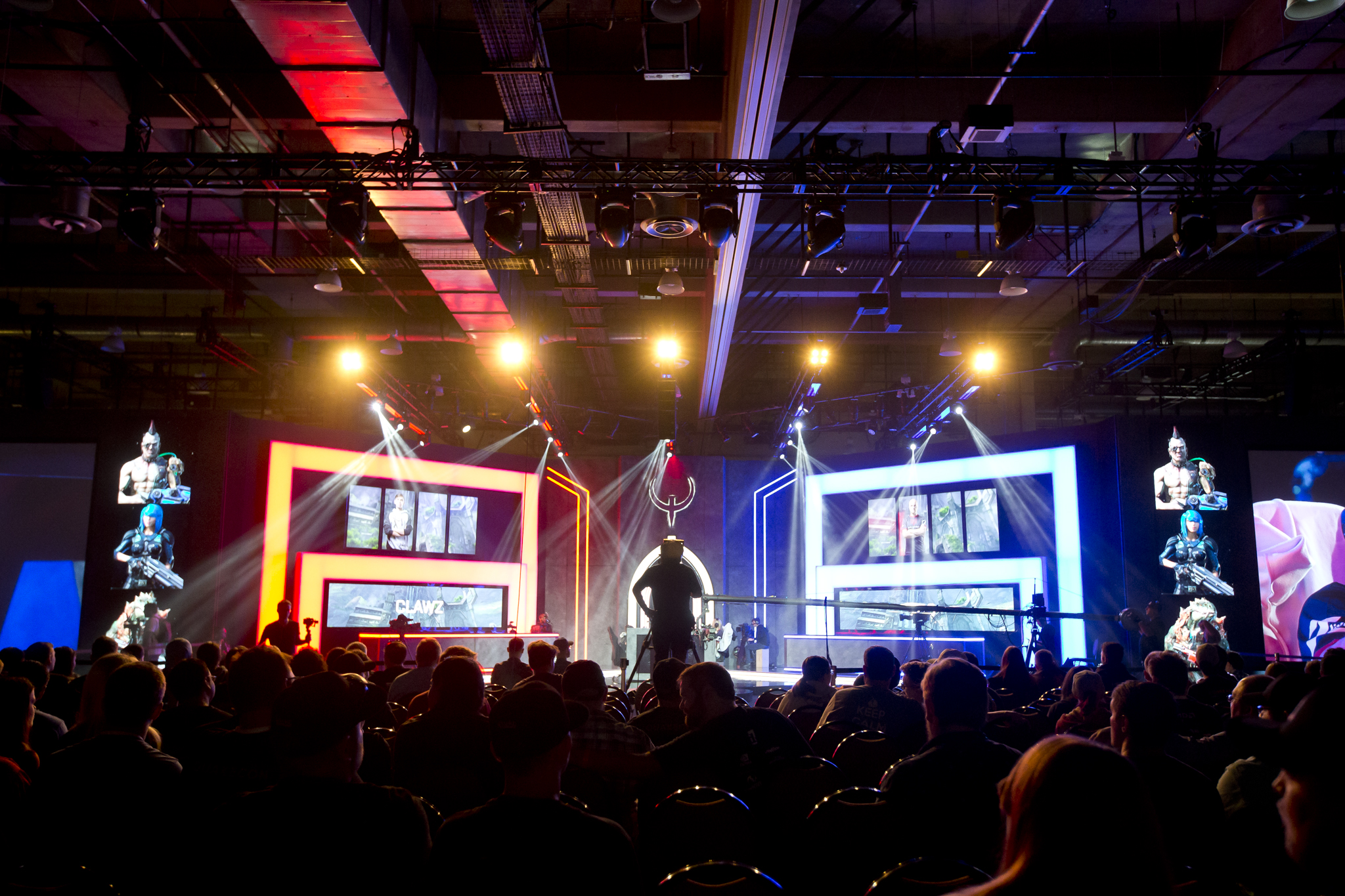
"It’s very painful to lose in 1v1 sometimes, because it wasn’t the game you lost to, it’s your opponent."
James “2GD” Harding
“It’s amazing for me. I’m just excited for the opportunity to play in multiple tournaments again,” he says. “I really liked Overwatch but it feels like a lot of the skills there are confining. … I gave it my all, but Quake is just my game.”
Rapha isn’t the only one. Id_ tells me he’d consider making a full-time comeback if the Champions scene stays healthy. Anton “Cooller” Singov inked a deal with esports giant Na’Vi to return to his roots. Alexey “Cypher” Yanushevsky did the same after logging time with both Counter-Strike and Overwatch. Quake legends around the world are watching Bethesda put their money where their mouth is, and are graciously taking the opportunity to see if they've still got what it takes.
Art of the duel
It’s hard to articulate exactly what these pros find in Quake that they can’t in other FPSes, but one thing is certainly clear: there’s no true 1v1ing in Overwatch. If you’re familiar with those old CPL derbys you know what I’m talking about—two players coasting the circumference of an arena, stacking green armor, weapons, and health in hopes of winning a frantic, five-second engagement. The 1v1 format tested your twitchiness, but it also evaluated how well you could read and react to your opponent, a perfect marriage of mindgames and rocket launchers. It’s a unique, and rewarding style of play that’s been missing in our era of role-based skirmishes for quite some time. If you grew up on whip-around nailgun blasts, perhaps Soldier 76’s auto-aim might seem a little cheap. “It’s just you and the other guy. There’s no other factors. It’s just who can play more consistent, and who can outsmart the other guy,” says Rapha.
“It’s incredibly personal,” says James “2GD” Harding, another former Quake pro and someone who’s been around esports for a long time. “[In 1v1] all of your intelligence and all of your dexterity is being challenged by the best players in the world. It challenges you so much that you can never really master it, but you can try to be the best at certain things. Like, maybe you try to win a tournament by being the best at aiming, or win a tournament by being the smartest player, or being the most aggressive player. It’s very painful to lose in 1v1 sometimes, because it wasn’t the game you lost to, it’s your opponent.”
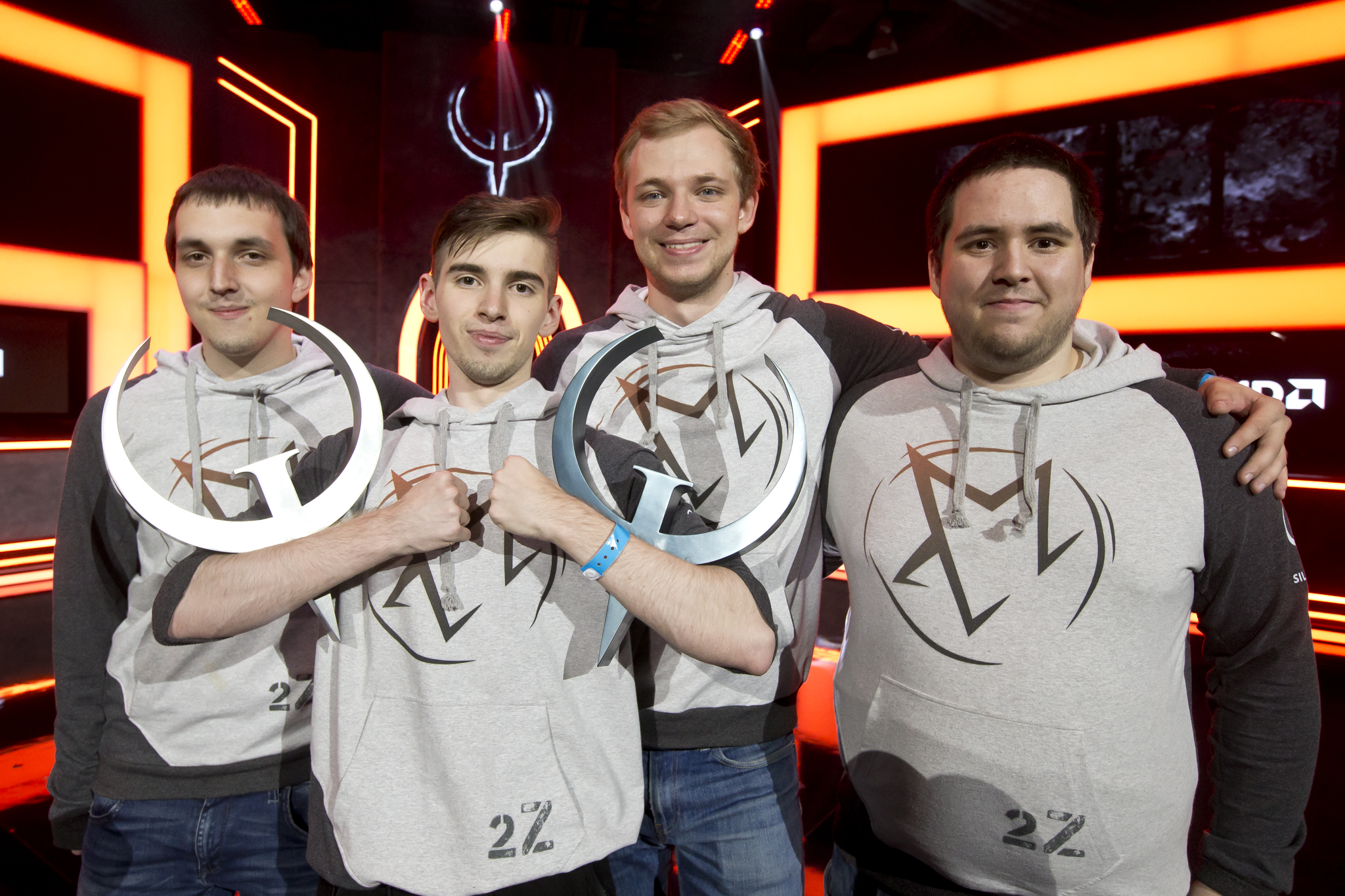
“I think in some ways we’re hoping to be replaced.”
James “2GD” Harding
Bethesda values the format enough to corner off $330,000 of the QuakeCon prizepool to the 1v1 bracket alone. Tim Willits has called Quake Champions’ dueling the “secret weapon” to the company’s esports plan, reckoning that it’s the one thing Champions has that other games don’t. It remains to be seen if Quake can crossover like it did in the ‘90s and early 2000s, but in the meantime it’s wonderful to watch the veterans get a run at something they used to obsess over. The QuakeCon tournament was full of great matches: in 2017 we had the pleasure of watching high-stakes sets between Cooller and Rapha, DaHanG and Noctis, Av3k and Vo0. These men have wives and kids, and they were still blasting off their feet in acrobatic rocket jumps. No matter what happens from here, we at least had the chance to watch the founding fathers of pro gaming live the dream one last time.
But maybe that’s also the one thing holding Quake Champions back. Esports, like any other competitive field, needs a trickle of new blood to survive. Running back the same posse of professionals under brighter lights and a felicitous bankroll doesn’t bode well for the future. “I think in some ways we’re hoping to be replaced,” says 2GD, noting that the average age of the players at Dota 2’s The International landed somewhere around 21.
That might sound like a strange thing to say, but then again, everyone at QuakeCon was there for the same reason. They love and fear for Quake, and while they’re happy to play a brand new game for a significant wad of cash, their primary concern is the continued prosperity of their favorite game. They won’t fall on their sword, but they’ll happily welcome the next generation if they earn it.
New blood
That wish was granted on the third day of the tournament. Team 2z were completely anonymous when they walked through the doors of the Gaylord Texan. Their Twitter account sports a scant 199 followers. They are unsponsored, unsanctioned, and reachable by a blasé gmail address answered directly by the players. Mostly, they’re in their early 20s and late teens, green as grass, and stacked up against a combined century of Quake experience in the other teams.
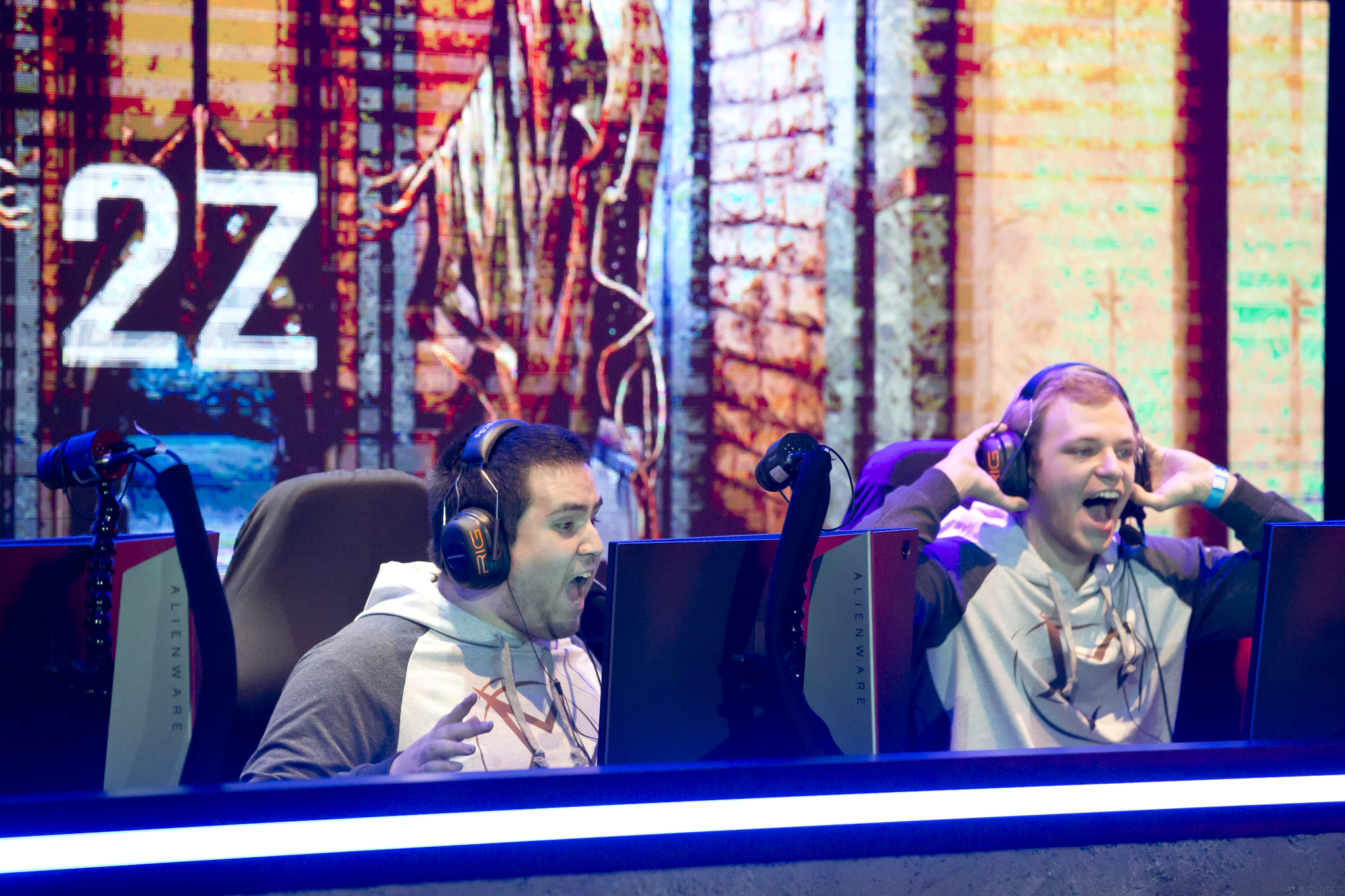
“Quake is fast, brutal and ridiculously hard to become good at.”
Nikita "Clawz" Marchinsky
And yet, they pulled off a clean sweep of every Quake Champions match at the show. 2z took home the team-based Sacrifice tournament with definitive wins over Team Liquid and the prodigious NOTTOFAST, and the 19-year old Nikita "Clawz" Marchinsky flat-out embarrassed Vo0 in the 1v1 championship with an icy 3-0 blow-out. They were, by far, the least famous players entering the weekend, and they exited as the undisputed best in the world.
“For me personally it was very special to compete against all the legends I grew up watching and idolizing. I think we were very underestimated LAN-wise before this event because all of them have so much more experience than us,” says Clawz, a few days after his victory. “It felt even more like that in the 1v1 tournament, where any predictions containing me among the top three were made fun of by the old legends. It felt amazing to prove them wrong and to show the world what I'm capable of.”
All four members of the 2z squad are excited about the upcoming Dreamhack tournaments: eager to defend their first-place status and clearly aware of the targets on their back painted by a legion of veterans. But they didn’t get to the top with any trickery or cheese, they’re simply outstanding FPS players who outworked their opponents in the film room and on the ladder.
Frankly, I was surprised that they decided to choose Quake. You get the sense that 2z could easily excel at Overwatch, or Counter-Strike, or any other FPS with a healthier, less-nubile scene than Champions. One of the players, Kyle “Silentcap” Mooren has a history with Quake III and Quake Live, but the others are arriving without any ruddy nostalgia. It speaks to the game’s legacy that they still found their home here.
“I've played some Overwatch and a bit of CS:GO as well, and as much as I enjoyed them, none of them are quite like Quake,” says Clawz. “Quake is fast, brutal and ridiculously hard to become good at.”
“I like to keep this tradition, I mean to play the first and the very best, hardest shooter in the world,” says Alexander “Latrommi” Dolgov.
QuakeCon is a high school reunion. They came across oceans to eat catered cheeseburgers, to reignite old rivalries, to remember how things were. There’s a brand new game, a lot of money, a lot of hope, and for the first time in a decade, they’re losing. For the first time in a decade, that’s the best news they could possibly get.

Luke Winkie is a freelance journalist and contributor to many publications, including PC Gamer, The New York Times, Gawker, Slate, and Mel Magazine. In between bouts of writing about Hearthstone, World of Warcraft and Twitch culture here on PC Gamer, Luke also publishes the newsletter On Posting. As a self-described "chronic poster," Luke has "spent hours deep-scrolling through surreptitious Likes tabs to uncover the root of intra-publication beef and broken down quote-tweet animosity like it’s Super Bowl tape." When he graduated from journalism school, he had no idea how bad it was going to get.

